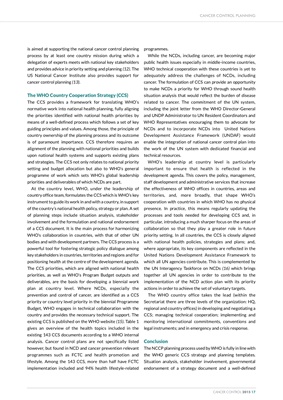
programmes.
While the NCDs, including cancer, are becoming major
public health issues especially in middle-income countries,
WHO technical cooperation with these countries is yet to
adequately address the challenges of NCDs, including
cancer. The formulation of CCS can provide an opportunity
to make NCDs a priority for WHO through sound health
situation analysis that would reflect the burden of disease
related to cancer. The commitment of the UN system,
including the joint letter from the WHO Director-General
and UNDP Administrator to UN Resident Coordinators and
WHO Representatives encouraging them to advocate for
NCDs and to incorporate NCDs into United Nations
Development Assistance Framework (UNDAF) would
enable the integration of national cancer control plan into
the work of the UN system with dedicated financial and
technical resources.
WHO's leadership at country level is particularly
important to ensure that health is reflected in the
development agenda. This covers the policy, management,
staff development and administrative services that increase
the effectiveness of WHO offices in countries, areas and
territories, and, more broadly, that shape WHO's
cooperation with countries in which WHO has no physical
presence. In practice, this means regularly updating the
processes and tools needed for developing CCS and, in
particular, introducing a much sharper focus on the areas of
collaboration so that they play a greater role in future
priority setting. In all countries, the CCS is closely aligned
with national health policies, strategies and plans; and,
where appropriate, its key components are reflected in the
United Nations Development Assistance Framework to
which all UN agencies contribute. This is complemented by
the UN Interagency Taskforce on NCDs (16) which brings
together all UN agencies in order to contribute to the
implementation of the NCD action plan with its priority
actions in order to achieve the set of voluntary targets.
The WHO country office takes the lead (within the
Secretariat there are three levels of the organization: HQ,
regional and country offices) in developing and negotiating a
CCS; managing technical cooperation; implementing and
monitoring international commitments, conventions and
legal instruments; and in emergency and crisis response.
Conclusion
The NCCP planning process used by WHO is fully in line with
the WHO generic CCS strategy and planning templates.
Situation analysis, stakeholder involvement, governmental
endorsement of a strategy document and a well-defined
CANCER CONTROL PLANNING
CANCER CONTROL 2015 17
is aimed at supporting the national cancer control planning
process by at least one country mission during which a
delegation of experts meets with national key stakeholders
and provides advice in priority setting and planning (12). The
US National Cancer Institute also provides support for
cancer control planning (13).
The WHO Country Cooperation Strategy (CCS)
The CCS provides a framework for translating WHO's
normative work into national health planning, fully aligning
the priorities identified with national health priorities by
means of a well-defined process which follows a set of key
guiding principles and values. Among those, the principle of
country ownership of the planning process and its outcome
is of paramount importance. CCS therefore requires an
alignment of the planning with national priorities and builds
upon national health systems and supports existing plans
and strategies. The CCS not only relates to national priority
setting and budget allocation but also to WHO's general
programme of work which sets WHO's global leadership
priorities and deliverables of which NCDs are part.
At the country level, WHO, under the leadership of
country office team, formulates the CCS which is WHO's key
instrument to guide its work in and with a country, in support
of the country's national health policy, strategy or plan. A set
of planning steps include situation analysis, stakeholder
involvement and the formulation and national endorsement
of a CCS document. It is the main process for harmonizing
WHO's collaboration in countries, with that of other UN
bodies and with development partners. The CCS process is a
powerful tool for fostering strategic policy dialogue among
key stakeholders in countries, territories and regions and for
positioning health at the centre of the development agenda.
The CCS priorities, which are aligned with national health
priorities, as well as WHO's Program Budget outputs and
deliverables, are the basis for developing a biennial work
plan at country level. Where NCDs, especially the
prevention and control of cancer, are identified as a CCS
priority or country level priority in the biennial Programme
Budget, WHO engages in technical collaboration with the
country and provides the necessary technical support. The
existing CCS is published on the WHO website (15). Table 1
gives an overview of the health topics included in the
existing 143 CCS documents according to a WHO internal
analysis. Cancer control plans are not specifically listed
however, but found in NCD and cancer prevention relevant
programmes such as FCTC and health promotion and
lifestyle. Among the 143 CCS, more than half have FCTC
implementation included and 94% health lifestyle-related